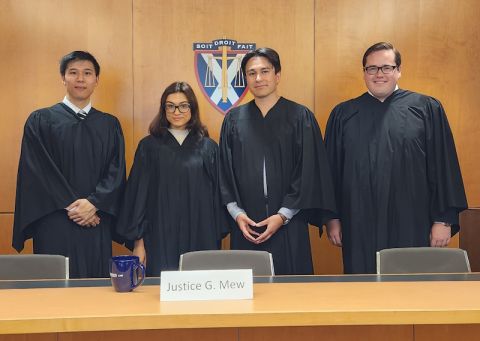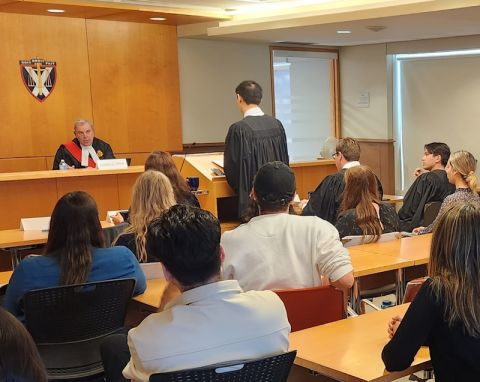

Students selected to represent Queen’s Law in 17 upcoming competitive moots recently witnessed masterful oral advocacy in action. They watched intently as four of the school’s top mooters demonstrated their skills in a mock trial of a real case before Superior Court Justice Graeme Mew at this year’s Grand Moot. In teams of two, mooters represented opposing sides of the Ontario Court of Appeal case R v. King, which dealt with applying Gladue principles to Corbett applications brought by Indigenous accused persons.
The “grand mooters” – Law’24 students Noah Favel, Nillab Hassani, Kelvin Lau, and Jason Thacker – share their advice on how to best prepare for a moot, present oral arguments, and answer judges’ questions.
Favel, a past oralist in the Kawaskimhon National Aboriginal Moot, says, “I recommend for mooters to predict what questions you will be asked, to be comfortable going off script, and to remain calm. Make sure you listen closely to the judge’s question to provide a clear answer.”
According to Thacker, whose team placed second in the All-America’s Round of the 2023 John H. Jackson International Trade Law Moot, “The best way to prepare for a moot is to create a simple, easy-to-follow structure that you can return to throughout your presentation and include a few citations you think will be important when discussing each topic. It’s important not to get too reliant on a script so you can move around your arguments based on the lines of questions you receive.”
Hassani, who competed in the Philip C. Jessup International Law Moot, elaborates further in her recommendation: “Focus on being comfortable with the material rather than learning a script and anticipating all the questions that might be asked,” she says. “Being comfortable with the material allows you to be conversational and confident. It also allows you to answer the judge’s questions without searching in your script, being destabilized, and trying to find your way back to your script once you are done answering. There will always be questions that you have not anticipated, but knowing the material allows you to answer confidently.”
Lau, who competed in the bilingual Laskin Moot focusing on administrative and constitutional law, has another presentation tip: “Remember that moots are often a conversation with the judges! Adapting to the judge’s questions and being responsive to their concerns while moving seamlessly through your own submissions is tough, but also the most fun part of any moot!”
Another critical thing to remember, Thacker points out, is to “never think of the judge or panel as your opponents; you should try to think of them as asking questions to help clarify your arguments. That isn’t to say some judges/panellists won't be difficult, but you never want to come off as combative while mooting.”
As for these students’ performances at the Grand Moot, Justice Mew says: “The quality of the advocacy skills of all of the mooters was exceptional. They were clearly well-prepared and not tied to their scripts. Nor were they thrown off by some tough questions. As these students ably demonstrated, the mooting program is a great opportunity to learn and develop advocacy skills in a supportive environment.”
Read more about the Queen’s Law Moot Court Program, which is one of the largest of any Canadian law school.